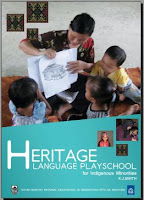[MLE] Book on "Heritage Language Playschools"

Dear multilingual education friends, Using the mother tongue in the anganwadis or preschools is not only done in Orissa, but also in Malaysia. Dr Karla Smith wrote a book on it titled " Heritage Language Playschools for Indigenous Minorities ". The MTB-MLE website reports: This book contains administrative and curriculum materials that can be used to establish and operate playschool programmes for indigenous communities. Carefully sequenced steps, covering pre-planning to evaluation, outline the process of setting up a local playschool with the aid of community involvement. The content covers pre-reading, pre-writing and readiness skills and provides an abundance of practical advice, forms and ideas based on sound educational theory.

